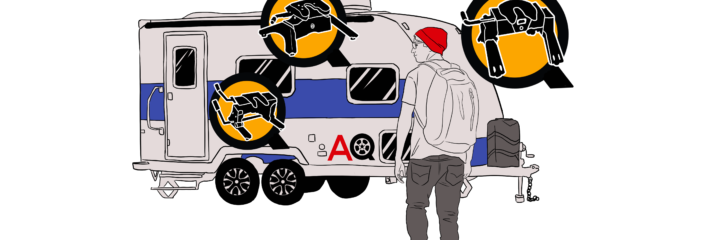Fifth wheelers are the ultimate way to experience the RV lifestyle or haul light to medium commercial loads. Boasting an abundance of space, these easy-to-maneuver trailers have got what it takes to bring the luxuries of home with you on the road.
If you’ve recently purchased a sweet new 5th wheeler or pickup truck, you’ll need to find yourself a suitable 5th wheel hitch to hook up your rig. And with so many options and confusing specifications to get a handle on, that’s no easy task.
But don’t stress, because we’ve put together an extensive 5th Wheeler Hitch Buyer’s Guide complete with the necessary details to make an informed decision. And we’ve also handpicked the Top 8 Fifth Wheel Hitches on the market to help you find the perfect product for your needs.
- Features to Consider With 5th Wheel Hitches
- Top 8 Best 5th Wheel Hitches 2025
- 1. Best 5th Wheel Hitch Overall: CURT 16120 A16 5th Wheel Hitch
- 2. Best Budget 5th Wheel Hitch: CURT 16115 E16 5th Wheel Hitch
- 3. Best Premium 5th Wheel Hitch: B&W Companion RVK3500
- 4. Best Value for Money 5th Wheel Hitch: Reese Fifth Wheel Hitch
- 5. Best High Capacity 5th Wheel Hitch: CURT 16245 Q24
- 6. Best Sliding 5th Wheel Hitch: Reese Towpower 30051 w/Kwik-Slide
- 7. Best Single Point Attachment 5th Wheel Hitch: PullRite 2600 Superlite
- 8. Best 5th Wheel Hitch for Ford Pucks: B&W RVK3300 Companion for Ford Puck
- Fifth Wheel Hitches Buyer’s Guide
- Best Fifth Wheel Hitches: Final Thoughts
Features to Consider With 5th Wheel Hitches
Before you purchase a 5th wheel hitch, it’s essential to review the key features. Without a sound understanding of the primary considerations, you could inadvertently buy one that’s not appropriate for your trailer or truck. Keep the following factors in mind while perusing our top recommendations
- Sliding Compatibility: Fixed hitches remain firmly in place while towing. They’re simple, cheap, and durable but limit your turning circle, thus causing the trailer to hit the tailgate of a smaller truck. Small truck owners need a hitch that’s compatible with a sliding mount.
- Towing Capacity: A 5th wheel hitch has a limited towing capacity, which refers to the amount of weight you can Ensure you get one that meets or exceeds your trailer’s weight and all the content within.
- Pivoting Heads: These reside where the trailer goes into the hitch to connect with your truck. Two-way pivoting heads move on one axis and afford less control while making sharp turns. The pricier four-way pivoting heads move on two axes for extra stability.
- Mounting System: Most hitches are mounted on a rail kit, either sold separately or included in the deal. Other options include under-the-bed or above-the-bed mounting systems that attach directly via a bracket.
- Jaws: Fifth wheel hitches use jaws to latch onto the trailer and reduce noise and movement while towing. Single-jaws tend to rattle on lighter RVs but are suitable for hauling heavy loads over 25,000 pounds. Double-jaw hitches can reduce noise on lightweight trailers.
| Product | Slide Compatible | Towing Capacity | Pivoting Heads | Mounting System | Jaws | Rating |
|---|---|---|---|---|---|---|
| CURT 16120 A16 5th Wheel Hitch | Yes | 16,000 pounds | Four-way cast yoke | OEM Puck or permanent rails | Dual interlocking | 5 |
| CURT 16115 E16 5th Wheel Hitch | Yes | 16,000 pounds | Four-way cast yoke | OEM pucks / rails / gooseneck adapter | Dual locking bar | 5 |
| B&W Companion RVK3500 | No | 20,000 pounds | Four-way fully articulating | Turnover ball | Dual 1-inch wrap-around jaws | 5 |
| Reese Fifth Wheel Hitch | Yes | 15,000 pounds | Four-way | Rails | Single jaw | 4.5 |
| CURT 16245 Q24 | No | 24,000 pounds | Spherical axial bearing | Base rails | Dual-locking jaws | 4.5 |
| Reese Towpower 30051 w/Kwik-Slide | Sliding mount included | 16,000 pounds | Four-way | Square tube slider | Dual-jaw locking system | 4 |
| PullRite 2600 Superlite | No | 20,000 pounds | Detachable base rails | Popular OE 2-5/16” gooseneck ball brands | 4 | |
| B&W RVK3300 Companion for Ford Puck | No | 20,000 pounds | Four-way | Ford OEM pucks | Single jaw | 3.5 |
Top 8 Best 5th Wheel Hitches 2025
1. Best 5th Wheel Hitch Overall: CURT 16120 A16 5th Wheel Hitch
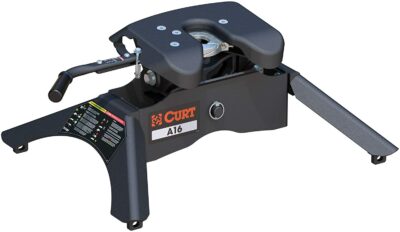
Editor’s Rating:
Quick Facts:
- Slide Compatible: Yes
- Towing Capacity: 16,000 pounds
- Pivoting Heads: Four-way cast yoke
- Mounting System: OEM Puck or permanent rails
- Jaws: Dual interlocking
The A-Series from CURT is the manufacturer’s premium range, and this A16 model is well worth the hefty price tag. Spending a bit extra on a high-end product such as this gives you easier coupling, a quieter ride, and a safer and more durable hitch overall—a smart investment for frequent tows.
CURT’s A-Series signature ergonomic handle and extra-wide head make coupling this beast a breeze, especially as the handle will self-reset back to the ready position after you’ve uncoupled. Novice and veteran users alike love the coupling indicator displaying the current status: coupled, uncoupled, and ready to tow.
A step up from cheaper 5th wheel hitches, the pivot heads here are made of cast yoke and feature high-end poly-torsion inserts. Consequently, you can expect a softer ride and minimal noise.
It’s rated for a GTW up to 16,000 pounds. Unlike the budget-minded CURT 16115 E16, we’re confident it could haul that much with ease. Standard legs come as part of the package, but you’ll need to purchase base rails or brackets yourself.
Overall, it’s a well-made hitch that’s easy to install, especially if you’ve already got the base rails in place. You might find cheaper out there, but the A16 is hard to beat.
Pros
- Easy coupling with extra-wide head
- Automatic handle reset after decoupling
- Simple coupling indicator
- High-quality pivot heads for a soft and quiet ride
- Easy to install
Cons
- Not the cheapest
2. Best Budget 5th Wheel Hitch: CURT 16115 E16 5th Wheel Hitch
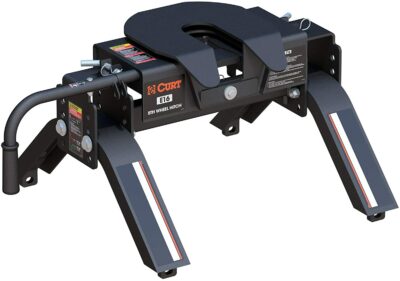
Editor’s Rating:
Quick Facts:
- Sliding Compatible: Yes
- Towing Capacity: 16,000 pounds
- Pivoting Heads: Four-way
- Mounting System: OEM pucks / rails / gooseneck adapter
- Jaws: Dual locking bar
The CURT E16 is the 5th wheel hitch of choice when you want a reliable trailer connection at a super low price. Coming in at a fraction of the cost of the competition, this budget-orientated option is a godsend for cash-strapped RVers.
A four-way pivoting head provides 10 degrees of lateral movement for a smooth ride, while an anti-rattle skid pad helps dampen noise and vibration. It’s easy to pop on, too, thanks to the automatic coupler feature.
As you’d expect for such a low price, the CURT E16 doesn’t include base rails and brackets—but don’t worry, there should be plenty of room left in the budget to purchase these separately. It’s compatible with fixed and sliding systems using either OEM pucks or rail mounts, so it’ll work with most truck types.
Despite their excellent reputation, some of the claims CURT make here should be taken with a grain of salt. Towing a 16,000-pound trailer with this hitch could be risky, and the pivot degree is probably more like 7 (rather than the stated 10).
Pros
- Ultra affordable hitch
- Four-way pivot head for a smooth ride
- Anti-rattle skid pad for less noise
- Automatic coupler for easy attachment
Cons
- Doesn’t include base rails
- Some claims are dubious
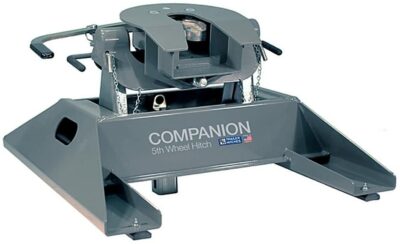
Editor’s Rating:
Quick Facts:
- Sliding Compatible: No
- Towing Capacity: 20,000 pounds
- Pivoting Heads: Four-way fully articulating
- Mounting System: Turnover ball
- Jaws: Dual 1-inch wrap-around jaws
Although you might break the bank upon buying this bad boy, the ensuing economic hardship will be worth it for the high-end hitch. Well-heeled RVers and commercial users alike agree the investment is solid for its smooth ride and ease of use.
The unit comes with a fully articulating four-way pivot for back to front and side-to-side absorption, while its industry-leading polyurethane bushings eliminate rattle and noise. Made right here in the USA, it’s a heavy-duty device that stands the test of time.
Note that it’s a turnover ball model, so you’ll need an appropriate under-bed mounting system. One big advantage of this layout is you can tow a 5th wheel or a gooseneck trailer without switching the hitch.
The downside to its ultra-durable design is weight—you’ll need a helping hand to slide it off your truck unless you’ve got Popeye-sized arms. At least the cam action latching handle makes it easy to remove, and you’ll enjoy a nice flat truck bed surface once it’s gone.
Pros
- Smoothest hitch on the market
- Remarkably quiet and rattle-free
- Durable, heavy-duty design
- Tow a gooseneck or 5th wheel trailer
- Flat surface on the truck bed after removal
Cons
- Very expensive
- Extremely heavy
4. Best Value for Money 5th Wheel Hitch: Reese Fifth Wheel Hitch
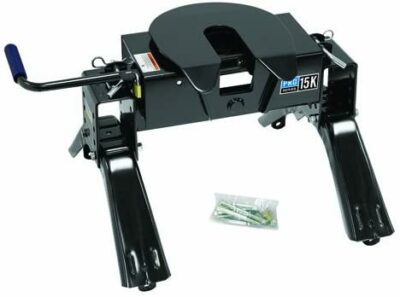
Editor’s Rating:
Quick Facts:
- Sliding Compatible: Yes
- Towing Capacity: 15,000 pounds
- Pivoting Heads: Four-way
- Mounting System: Rails
- Jaws: Single jaw
This mid-range option from Reese gets good grades from us not because it’s an exceptional product but because it represents outstanding value for money.
With high-end features like a four-way pivoting head, skid plate pivots, and a heavy-duty jaw handle with a padlock tab for added security, the unit is hard to beat at this price point. A set of wide stance one-piece legs add extra stability to sweeten the deal.
We’re rather fond of its versatility, too, as it’s compatible with a slider system and the #30035 base rail kit. The hitch is easy to install and can be entirely removed to restore versatility to the truck bed, while a vertical adjustment from 13” to 17” fits most trucks and trailer combos.
One thing we’re not in love with is the meager 5-degree pivot on the skid plate. If you’re going to try and hook this up on an uneven surface, you’ll find the process a chore.
Pros
- Excellent value for money
- Wide stance legs add stability
- Lockable through the jaw handle
- Fits most trailers and trucks
- Truck bed can be used after hitch removed
Cons
- Hard to couple on uneven surfaces
5. Best High Capacity 5th Wheel Hitch: CURT 16245 Q24
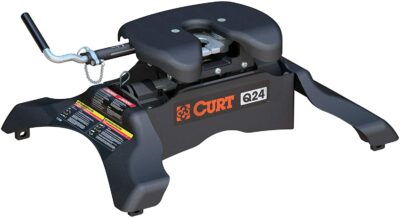
Editor’s Rating:
Quick Facts:
- Sliding Compatible: No
- Towing Capacity: 24,000 pounds
- Pivoting Heads: Spherical axial bearing
- Mounting System: Base rails
- Jaws: Dual-locking jaws
If you’re in the market for a rigid and reliable hitch that’s capable of hauling an enormous 5th wheeler, then look no further than the Q24 from CURT. With a maximum towing capacity of 24,000 pounds, it’s your go-to option for oversized campers or beefy commercial trailers.
One of this model’s standout features is the patented spherical axial bearing, which provides a smoother ride than even the most advanced four-way pivot heads. Uncoupling is easy via a short-throw handle, and a handy 3-position indicator lets you see the coupling status at a glance.
It does okay in the versatility stakes, as it’s compatible with all industry-standard 5th wheel rails. Don’t try and hitch this one up to a turret-style pin box, though, as it would buckle under the load. That means you won’t be able to use it with the CURT sidewinder (sliding) mount—but you really shouldn’t try and haul 24,000 pounds on a small truck anyway.
You get a pair of standard fifth legs in the box but expect to purchase the rails separately.
Packaging issues are known to occur with this unit, but it comes with a lifetime warranty, so you shouldn’t have to worry about missing out (if you’ve got plenty of time and patience, that is).
Pros
- High towing capacity
- Spherical axial bearing for a smooth ride
- Easy coupling and handy coupling indicator
- Industry-standard legs included
Cons
- No sliding mount compatibility
- Packages may arrive with damage
6. Best Sliding 5th Wheel Hitch: Reese Towpower 30051 w/Kwik-Slide
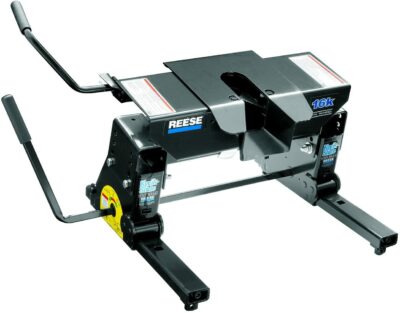
Editor’s Rating:
Quick Facts:
- Sliding Compatibility: Sliding mount included
- Towing Capacity: 16,000 pounds
- Pivoting Heads: Four-way
- Mounting System: Square tube slider
- Jaws: Dual-jaw locking system
If you plan to tow a 5th wheel trailer on a small pickup truck (6 to 8 ‘bed), you’re going to need a sliding mount to stop it banging into the side on tight turns. And while many of our top picks are compatible with sliding mounts, the kwik-slide system from Reese is the cream of the crop for its impressive functionality.
The Towpower 30051 comes with the kwik-slide included as part of the deal, making it an outstanding option for small truck owners. The sliding mechanism moves 10 inches to achieve an optimal turning circle, letting you navigate windy roads with greater confidence than ever before.
You’ll also get a four-way pivot for smooth towing, a sturdy dual-jaw lock for added durability, and a set of wide-stance legs for extra stability. We love how easy it is to couple on uneven ground, all thanks to its 6 side-to-side pivot system.
The installation is a bit of a pain, as many sliders are. You’ll need to grease up certain parts of the hitch yourself, some of which are challenging to reach.
Pros
- Comes with a kwik-slide mounting system
- Great for smaller pickup trucks
- Optimal turning circle
- Four-way pivot for smooth towing
- Easy to couple on uneven ground
Cons
- A chore to install
7. Best Single Point Attachment 5th Wheel Hitch: PullRite 2600 Superlite
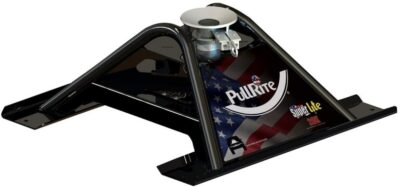
Editor’s Rating:
Quick Facts:
- Sliding Compatible: No
- Towing Capacity: 20,000 pounds
- Mounting System: Detachable base rails
- Compatibility: Popular OE 2-5/16” gooseneck ball brands
Single point attachment is a unique style of 5th wheel hitch designed to hook up quickly and obtain an ultra-tight connection for a smoother ride. The big drawback is they tend to warp over time because the hitch rocks back and forth as you start and stop.
The PullRite 2600 Superlite overcomes this common conundrum through its high-grade steel frame and a generous undercoating of a specially formulated bed lining material. The innovative design works wonders on the road; it can tow up to 20,000 pounds without suffering excessive wear and tear.
Another neat advantage is 5th wheel and gooseneck owners can swap trailers around without changing the hitch, which is a significant time-saver. You also get the option of positioning it in front or behind the gooseneck ball, thus affording the user greater control.
While we don’t recommend other single point attachments, this American-made product gets our tick of approval for its impressive durability. It’s far from bulletproof, but it’s a viable alternative to your standard 5th wheel hitch connection.
Pros
- Tight connection for a soft ride
- More durable than others of its type
- Can swap between 5th wheel and gooseneck trailers
- Can position in front or behind gooseneck ball
Cons
- Still somewhat prone to wear and tear
8. Best 5th Wheel Hitch for Ford Pucks: B&W RVK3300 Companion for Ford Puck
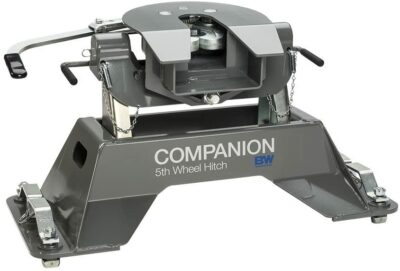
Editor’s Rating:
Quick Facts:
- Sliding Compatible: No
- Towing Capacity: 20,000 pounds
- Pivoting Heads: Four-way
- Mounting System: Ford OEM pucks
- Jaws: Single jaw
If you’ve got a Ford truck with a four-puck mounting system on the bed, then take a close look at this ultra-handy hitch from B&W.
The RVK3300 Companion is designed explicitly with Fords in mind; it slides effortlessly into the pucks in seconds flat. Removing the hitch is just as easy thanks to its basic two-piece design and cam-actuated latching mechanism. And once removed, you’ll have the whole truck bed free to do with as you please.
Easy installation aside, it’s a wonderful hitch to have on your truck. Polyurethane bushings ensure utmost quiet on the road, while three vertical adjustments let you fine-tune coupling positions. A four-way fully articulating pivot head system and the inch-thick cast-locking jaw work in harmony to enhance the smoothness of the ride.
We’d probably rate this among the best hitches on the market if it weren’t for one obvious caveat: it’s only suitable for Fords. If you’ve got a compatible Ford truck, take a look. If not, keep on scrolling.
Pros
- Super easy to install and remove
- Frees up the truck bed when removed
- Smooth and quiet ride
- Can fine-tune coupling positions
- Suitable for coupling on rough terrain
Cons
- Only compatible with specific Ford trucks
Fifth Wheel Hitches Buyer’s Guide
Fifth wheel hitches aren’t a one-size-fits-all kind of deal; there’s a whole bunch of things you need to know about the technology before investing in one of your own. And that’s why we’ve compiled this in-depth buyer’s guide—to give you the necessary expertise to make an informed decision.
Gooseneck vs. Bumper Pull vs. 5th Wheel Hitches: Which Option Is Right for You?
Although most RVers opt for the 5th wheel hitch, you’ll sometimes see campers towing on a gooseneck hitch or a bumper pull hitch as well. Here we’ll discuss the pros and cons of each.
Fifth Wheel Hitches
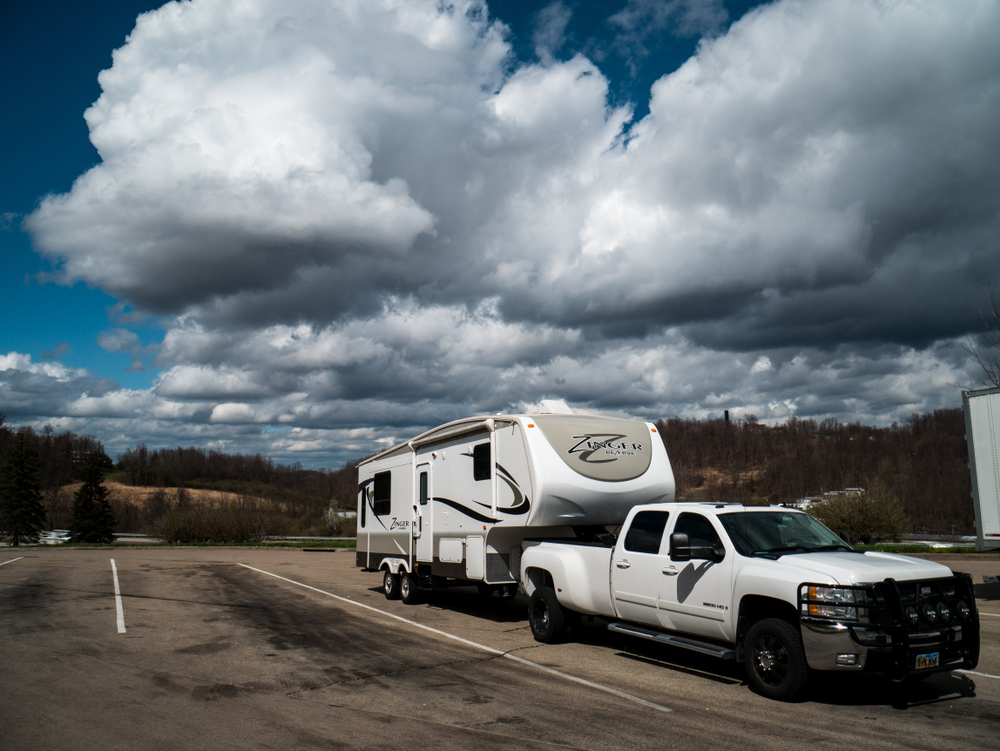
A 5th wheel hitch connects the truck bed to the kingpin of a 5th wheel trailer, allowing for efficient and hassle-free towing. Metal jaws lock the trailer kingpin in place, while a pivoting head—with either two or four axes—on the truck bed lets the driver tow more smoothly. Fifth wheel hitches are standard for RV use and have a weight capacity between 16,000 and 30,000 pounds
On the downside, this system is often more expensive to install and requires a truck with sufficient space in the back for the hitch.
Pros:
- Easy to tow
- Safest at high speeds
Cons:
- Requires truck
- Uses lots of space on the bed
- Expensive to buy/install
Best for:
- RV and light commercial use
Gooseneck Hitches
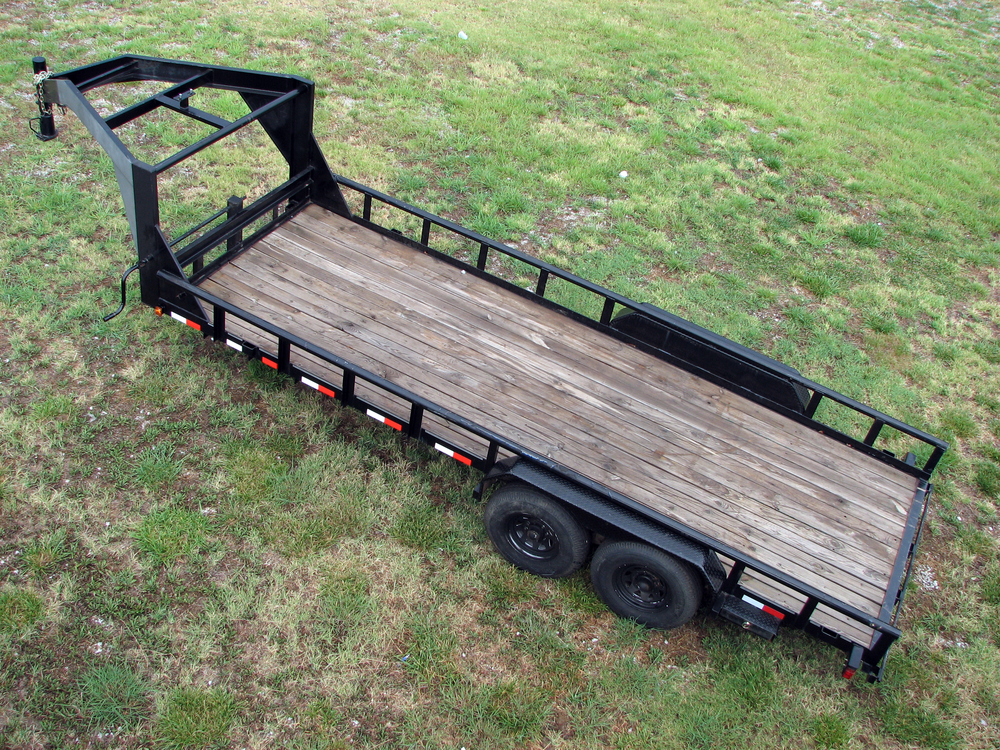
Gooseneck hitches connect a gooseneck trailer with a truck bed through a hitch ball. The system allows for heavier loads over 30,000 pounds, making it ideal for agricultural or commercial use. Hitch balls are less invasive (they take up less space) than 5th wheeler hitches.
However, gooseneck hitches make for a bumpier and louder ride, something the avid RVer knows to avoid.
The main reason some RVers stick with a gooseneck hitch is they already have a gooseneck trailer.
Pros:
- Allows for heavy loads
- Requires less space in the truck bed
Cons:
- Bumpier ride
- Moderate stability at high speed
- Requires truck
Best for:
- Heavy commercial use
- Large trailers
Bumper Pull Hitches

Bumper pull hitches attach to a hitch ball on the vehicle’s back bumper, hence the name. As most large vehicles already have a hitch ball in place, there’s no need to install a new one. What’s more, if you already own an SUV but not a pickup truck, you can tow with your existing ride—bumper pull towing doesn’t require a truck.
The disadvantages are that bumper pull towing comes with a lower weight capacity (often under 10,000 pounds) and is more prone to trailer sway at high speeds (correct weight distribution is crucial). Most RVers who tow on a bumper pull hitch have already got an SUV and don’t want to invest in a new pickup truck.
Pros:
- Most vehicles already have a ball hitch on the bumper
- Doesn’t require a truck for towing
Cons:
- Low weight capacity
- Tendency to sway at high speeds
Best for:
- Towing without a truck
- Light RV and commercial use
What You Need to Know When Buying a 5th Wheel Hitch
Now you’ve confirmed whether the 5th wheel hitch is the best option for you, let’s delve deep into the primary considerations. Fifth wheel hitches are either fixed in place or include a sliding mechanism that allows them to move while in motion.
Fixed 5th Wheel Hitches
These 5th wheel hitch types are firmly mounted in place so the hitch can’t move while in motion, resulting in an inferior turning circle. The mechanism has fewer moving parts; thus, it’s cheaper to purchase and less susceptible to wear and tear. On smaller truck beds (less than 8 feet or so), a fixed hitch could cause the trailer to whack into the cab on tight turns.
Pros:
- Cheap to purchase
- Durable
Cons:
- Harder to maneuver
- Not suitable for small trucks
Sliding 5th Wheel Hitches
Sliding 5th wheel hitches are specially designed for short bed trucks as the trailer won’t clip the cab on tight turns. As these hitches are more complex, you’ll pay a bit more upfront and may have to fork out for extra maintenance. The driver can position the kingpin on the slide bars without remounting the hitch, which adds extra convenience.
Pros:
- Suitable for smaller trucks
- Can move kingpin without remounting hitch
- Easier to maneuver
Cons:
- More expensive
- May require maintenance
Our favorite 5th wheel hitch that includes a sliding mount is the Reese Towpower 30051 w/Kwik-Slide.
Towing Capacity
Towing can be deadly if you don’t know what you’re doing, and one of the critical factors to consider is towing capacity. Do the math carefully and double-check everything before investing in a hitch (or a vehicle or trailer, for that matter).
Failure to comply with the following ratings could lead to hefty fines or worse—an accident causing injury or death.
Vehicle Rated Towing Capacity
This refers to the maximum weight your towing vehicle can legally (and safely) tow. While some websites offer online calculators, it’s best to source this information straight from your owner’s manual or the car manufacturer’s website as well.
If your vehicle rated towing capacity doesn’t exceed your Gross Trailer Weight (GTW)—when it’s fully loaded with furniture, food, water, and fuel—you’ll need to invest in a bigger truck or smaller trailer. Upgrading your hitch won’t help.
Hitch Rated Towing Capacity
The hitch rated towing capacity refers to how much weight the hitch can support. This figure must be higher than your Gross Trailer Weight and preferably lower than your vehicle rated towing capacity.
Buying a hitch with a towing capacity exceeding that of your vehicle would be a waste of money because the heavy-duty hitches cost substantially more. Worse yet, you could confuse the two ratings and accidentally tow more than you should, thus exposing yourself and others to harm.
Our top 5th wheel hitch with a massive towing capacity is the CURT 16245 Q24.
Pivoting Heads
If you’re looking to save, you might be tempted to opt for a cheaper two-way pivot on your hitch. This budget orientated design allows the trailer to pivot forward and back. As a result, it reduces stress on the kingpin when you drive up and down hills, but it doesn’t offer much protection on uneven roads.
Although they’re more expensive, four-way pivots—AKA floating hitches—are by far the superior option. These allow the trailer to move left, right, forward, and back, ideal for bumpy roads and uneven gradients. The extra comfort and stability make them worthwhile for all but the most cash-strapped RVers.
Other hitch pivot features include self-aligning heads for easy height adjustments, cast yoke casings for enhanced durability, and higher pivot degrees for easier coupling on gradients.
The CURT 16120 A16 5th Wheel Hitch has the best pivoting head system on the market.
Mounting System
How you’ll mount your hitch to your truck bed is another critical factor to consider. Some hitches come with a mounting system included in the deal, while others require a separate purchase. If you’re buying a brand new truck, ask the dealer about factory-installed towing prep packages—it might be cheaper and easier than DIY.
Note that the mounting system is largely the preference of the user. Most 5th hitches are compatible with multiple mounting systems. Read the product descriptions carefully and confirm with the seller if you’re uncertain.
Pro Tip: if you’re planning to switch between a gooseneck and fifth trailer on the same truck, look for a mounting system that’s compatible with both hitch types.
Mounting Rails
Most 5th wheel hitches are mounted to a truck through a set of rails bolted onto the bed. This ubiquitous mounting system creates a steadfast frame the hitch can easily and securely latch onto. Mounting rails are somewhat universal; almost every mounting rail kit will be compatible with nearly every hitch. Always double-check if you need to purchase a rail kit (with the relevant bolts, brackets, and other odds and ends) instead of the rails by themselves.
If possible, opt for a custom rail kit specially designed for your specific truck. These make use of existing holes in the bed to negate the need for drilling new ones, thus saving you money and preserving the aesthetics of your ride.
If no custom rail kit exists for your truck, you’ll need to grab a universal one instead. These work on pretty much any kind of truck bed but will require you to drill in holes.
Over-the-Bed Brackets
If you’re installing a universal rail kit sold with your hitch, it’s worth considering quick install brackets. This simple option can cut installation time down to about an hour and is available for a wide range of trucks.
The system works by using brackets to connect the hitch into existing holes underneath the frame. You then drill holes through the truck bed to align with the bracket, thus creating a connection plate to bolt the rails in.
Under-the-Bed-Brackets
Another option is under-the-bed brackets; it’s especially enticing should you wish to preserve the utility of your truck bed. Even though other mounting types let you remove the hitch from the bed, the elevated mounting rails will remain, making it challenging to load and unload cargo.
A frame-mounted in an under-the-bed system, on the other hand, doesn’t leave any railings on top—the untrained eye won’t even notice you’ve had a 5th wheel hitch installed at all. The installation process is more time-consuming and complex, but it’s worth it if you’re desperate to preserve the flatness of your truck bed.
Puck Mounting Systems
Puck mounting systems have the mounting posts installed into the hard points (pucks) of the truck bed. Several factory standard holes protrude through the bed of specific trucks, in which you can insert the mounting posts of a compatible hitch. That way, the truck bed remains almost entirely flat and can still be used as normal.
Puck systems vary between manufacturers, with OEM, OE, and Ford being common styles.
Jaws
Hitch jaws are designed to hitch onto the kingpin of the trailer to stabilize the weight and minimize noise while in motion.
Single-Jaw Mechanisms
The one-piece locking jaw mechanism serves as a wedge and reduces slack in the connection as it closes. You’ll get optimal jaw to kingpin contact and a softer, smoother ride with a heavier load.
These are mostly used for massive farming and commercial vehicles with a weight of 25,000 pounds or more.
Dual-Jaw Mechanism
In a dual jaw coupler, the connection wraps around the kingpin and locks securely into place.
Dual jaw mechanisms are suitable for RV use and are commonly found with towing rate capacities under 20,000 pounds.
The Benefits of RVing in a 5th Wheel Trailer
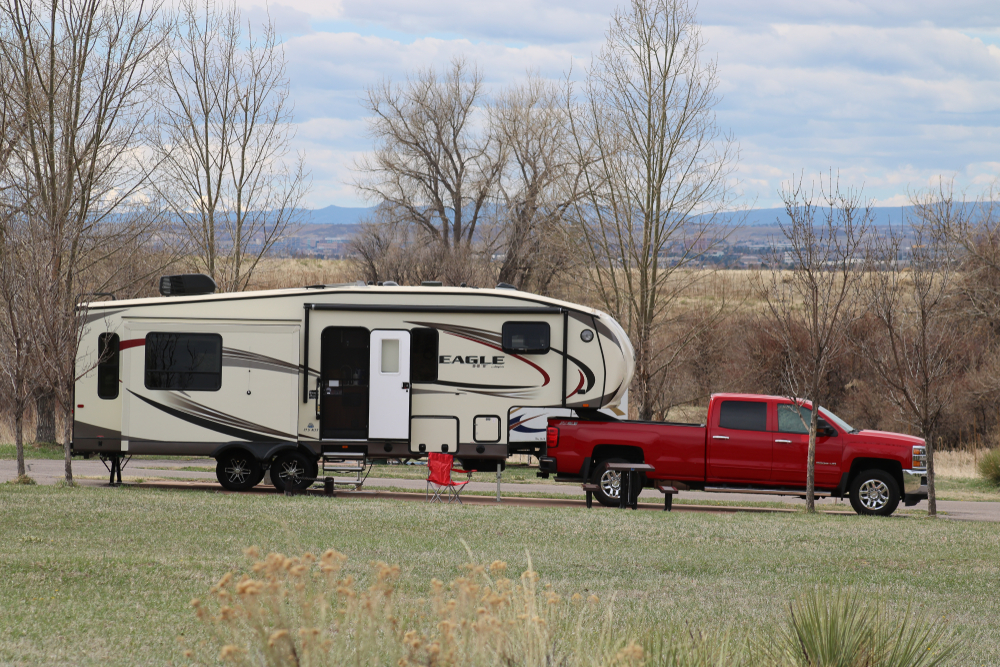
There’s a good reason almost every trailer you see in the RV park is a 5th wheeler—several reasons, mind you. Here are some of its big benefits compared to other trailer types and the ever-present Class A RV.
A Smoother Ride
Fifth wheel hitches facilitate easy turning; you can drive as you usually would and trust the trailer to follow suit. Bumper pull towing is challenging to master, especially on tight windy roads and through packed RV parks.
A Better Safety Record
Fifth wheel hitches are safer and sturdier as you put the pedal to the medal. Because the hitch point is up high, you’ll experience less trailer sway, a common cause of towing accidents. Fifth wheeler hitches also provide a superior weight distribution through a more secure anchor point.
Less Gasoline
Fifth wheel trailers use less gasoline than a Class A RV of a similar size. Your miles per gallon will be much higher than it would without the trailer, but you’ll still be using way less than you would in a massive motorhome.
Cheaper to Buy
If you’ve already got a tough pickup truck with a high towing capacity—as many outdoorsy folks do—then you needn’t buy an expensive motorhome. Just grab a 5th wheel trailer to whack on the end and enjoy low-cost camping for years to come.
Stacks of Space
Fifth wheelers offer enough room for entire families to travel in comfort or for solo campers and couples to stretch out in style. Ranging from 20 to 40 feet in length, you can’t beat the space a 5th wheeler affords.
Freedom to Explore
With a 5th wheel trailer, you can dump your mobile home at the RV park and jet off in your pickup truck to explore. It’s like a two-in-one combo deal, a sizeable portable house to live in and an agile vehicle for day trips. Big motorhomes don’t offer the same flexibility as you’re confined to the one oversized vehicle all the time—good luck finding a beachfront park for that 40-foot Class A of yours!
Fifth Wheel Hitches FAQ
Still got questions about 5th wheel hitches? Check out the following FAQ.
Who Makes the Best Fifth Wheel Slider Hitch?
Although there’s plenty of competition on the market, we rate CURT as the top manufacturer. Specifically, the 16120 A16 5th Wheel Hitch is our favorite overall for its durability, smoothness, and quietness.
Which Is Better, Gooseneck or Fifth Wheel Hitch?
It depends on what you’re planning to do. Fifth wheel hitches make for a smoother and more comfortable ride; thus, they’re the preferred option for most RVers. Gooseneck hitches take up less space and offer a higher towing capacity, making them a hit among commercial users.
What Is the Best Fifth Wheel Hitch for a Short Bed Truck?
It’s a tough call, but we rate the Reese Towpower 30051 w/Kwik-Slide as the top 5th wheel hitch for short truck beds. The sturdy hitch is specially designed for beds under 8 feet, providing optimal comfort and safety on the road at a reasonable price.
Do You Need a Dually to Pull a 5th Wheel?
You don’t necessarily need one, but they do have their advantages. Dual wheel trucks provide better stability, safety, and comfort while hauling a large load, plus they tend to entail a higher weight capacity. On the downside, a dually is harder to park, consumes more fuel, and requires more tire maintenance.
Do You Need a Slider Hitch for a 6.5 ft Bed?
Yes, you do. While a fixed position hitch is ideal for trucks over 8 feet, it will cause the trailer to clip your cab when making a tight turn on a short truck. Opt for a sliding hitch on trucks between 6 and 8 feet.
Best Fifth Wheel Hitches: Final Thoughts
Now you’re an expert on the 5th wheel hitch, it’s time to seek out the perfect product for you. Remember to factor in our Primary Considerations as well as the size and weight dimensions of your trailer and truck.
Once you’ve worked out what you want, take the time to peruse our Top Recommendations to find a 5th wheel hitch that works for you.
Whether you’ll be cruising with a roomy decked out camper or hauling a profitable payload in your commercial truck, the right 5th wheel hitch will make your towing life more of a pleasure than a chore.
